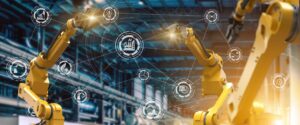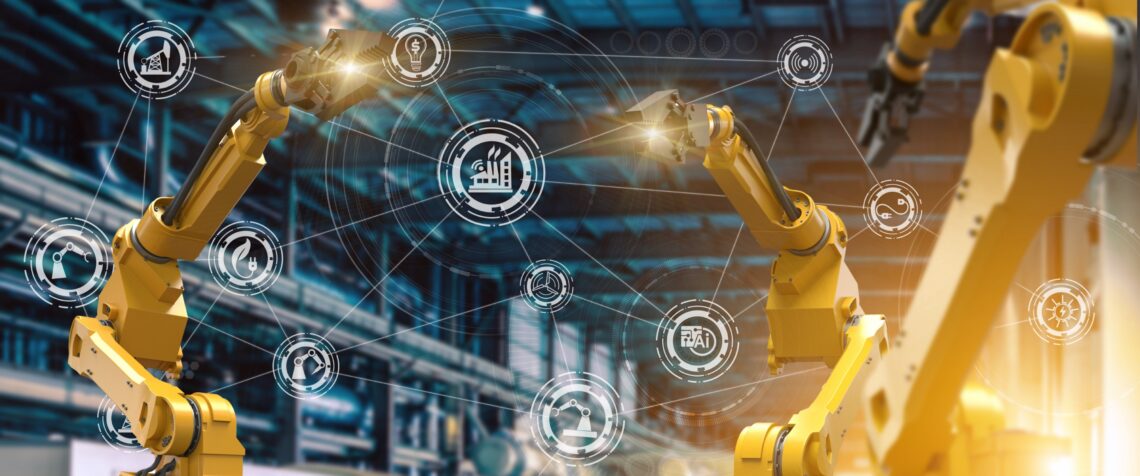 Our last blog focused on understanding the various types of Artificial Intelligence. Some of them are already present in multiple services and products we use, while some of them are still decades away from materializing. Continuing in the AI series, we shall now look at some of the significant AI applications in manufacturing today.
Our last blog focused on understanding the various types of Artificial Intelligence. Some of them are already present in multiple services and products we use, while some of them are still decades away from materializing. Continuing in the AI series, we shall now look at some of the significant AI applications in manufacturing today.
What are the different challenges manufacturers are trying to address using AI? And how are they benefiting? Let’s try and answer these questions.
Predictive maintenance:
Downtime and accidents are huge contributors to low production efficiency. Manufacturers can utilize AI to forecast when or if equipment shall fail and, accordingly, schedule maintenance activities. Such predictive analysis saves not only time but also cost.
Generative design:
Gone are the days when design engineers had to spend hours and days developing possible design options for a product. With Generative Design software, they only have to enter design parameters (such as materials, size, weight, strength, manufacturing methods, and cost constraints). The software generates thousands of design options that can be created. Such software uses AI algorithms to replicate an engineer’s approach to design.
Price forecasting of raw material:
Price volatility of raw materials is a significant challenge for manufacturers. They continuously have to adapt to the market prices. To remain competitive, sometimes, they must also forego profits. Thankfully, there are some AI-powered software available in the market today that are better at predicting than humans. Future raw material prices can be predicted, and the stock orders can be optimized to save costs.
Robotics:
Industrial robots have been present since the  1970s. They automate repetitive tasks, reduce reliance on human labor, and help shift humans to higher-order tasks. But they just got more intelligent. With AI, the robots can monitor their accuracy at work and train themselves to get better. They are equipped with the ability to ‘learn.’
1970s. They automate repetitive tasks, reduce reliance on human labor, and help shift humans to higher-order tasks. But they just got more intelligent. With AI, the robots can monitor their accuracy at work and train themselves to get better. They are equipped with the ability to ‘learn.’
Quality assurance:
Nowadays, assembly lines are data-driven and interconnected. Such lines work on parameters and algorithms that provide guidelines to produce the best possible end-products. AI systems are then used to detect the deviations from set values through sensors or machine vision technology (in case of visible parameters). When a particular parameter for a unit falls below the set standards of quality, the AI system sounds an alert so that engineers can make necessary adjustments quickly.
Inventory management:
Another primary application of AI in the manufacturing cycle is in the control of inventory. AI systems are exceptionally effective at demand forecasting and supply planning. They provide more accurate results as compared to traditional forecasting methods. A direct benefit of using such techniques is that cash-in-stock and out-of-stock scenarios are less likely to happen, leading to cost savings.
Benefits of AI in manufacturing
The emergence of dark factories and 24/7 production:
Dark factories, or factories without human labor that require no lights to function, are still an experimental concept. However, as AI continues to develop and robots become more intelligent, dark factories will increase. They will unleash significant savings, end workplace accidents and expand their production capacity.
Safety:
Human labor remains at the constant risk of accidents and physical harm in a manufacturing plant. With the introduction of AI systems, human work can either be replaced from the shop-floor or be aided in protection.
Cost Reduction:
AI systems can enhance an organization’s analytics capabilities to utilize resources better, make better forecasts, reduce inventory costs, etc. Moreover, you need not pay robots monthly wages! Of course, one must weigh the CAPEX against such savings and only then invest.
Given the rising AI applications in manufacturing that add tremendous value to the business, the incorporation of AI systems will only increase. In fact, according to Capgemini’s research, more than half of European manufacturers (51%) are implementing AI solutions, with Japan (30%) and the US (28%) following in second and third. The same study also reveals that the most popular AI use cases in manufacturing are around maintenance (29%) and quality (27%).
Yantra continues to incorporate advanced technologies such as AI in its products. We aim to be the leaders in the space of AI adoption. Stay tuned to our Knowledge Corner as we look at another next-gen technology in the coming blogs.



